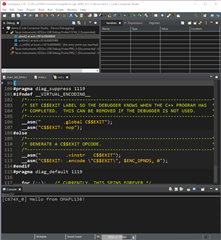Other Parts Discussed in Thread: OMAP-L138
I just got my OMAP-L138, followed the FAQ but still couldn't get the Hello World / blinky example to work.
I'm using XDS200 emulator.
e2e.ti.com/.../faq-omap-l13x-c674x-resources-and-faq
Expected outcome: An LED blinking (as per the code USER_LED0)
Result: only 1 LED is ON all the time (as per the code USER_LED1)
There is no toggling of USER_LED0 or USER_LED1.
See attached image.

I confirmed that JTAG isn't the issue.
Refer to attachments.


Aside, how do I resolve the linker?
Example, wanting to call the GPIO hardware access layer from my application.
Refer to attached.

Looking forward to hearing from you.
Best regards,
Daniel


